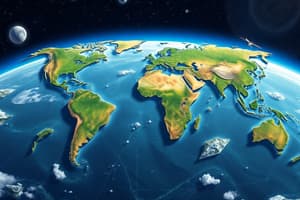Podcast
Questions and Answers
What is the primary focus of physical geography?
What is the primary focus of physical geography?
- Study of human cultures and societies
- Analysis of spatial data using GIS
- Natural features like landforms and climate (correct)
- Mobility of goods and ideas
Which term describes areas defined by common features?
Which term describes areas defined by common features?
- Region (correct)
- Location
- Movement
- Place
What does human-environment interaction explore?
What does human-environment interaction explore?
- How humans adapt to and modify their environment (correct)
- Natural disasters and their impact
- Movement of people and goods
- The use of GIS technologies
What is the study of cultural practices and their impact on spaces known as?
What is the study of cultural practices and their impact on spaces known as?
What are the coordinates defining locations on Earth known as?
What are the coordinates defining locations on Earth known as?
Which of the following is a key concept in cartography?
Which of the following is a key concept in cartography?
Which branch of geography focuses on the analysis of urban spaces?
Which branch of geography focuses on the analysis of urban spaces?
What is the arrangement of physical features of an area known as?
What is the arrangement of physical features of an area known as?
Flashcards are hidden until you start studying
Study Notes
Key Concepts in Geography
-
Definition:
- Geography is the study of the Earth’s landscapes, environments, and the relationships between people and their environments.
-
Branches of Geography:
- Physical Geography:
- Focuses on natural features like landforms, climate, vegetation, and ecosystems.
- Human Geography:
- Examines human activities, cultures, societies, and their relationships with the environment.
- Geospatial Technologies:
- Utilizes tools like GIS (Geographic Information Systems), GPS (Global Positioning System), and remote sensing for spatial data analysis.
- Physical Geography:
-
Major Concepts:
- Location:
- Absolute (exact coordinates) vs. Relative (contextual location).
- Place:
- Describes the physical and human aspects of a location.
- Region:
- Areas defined by common features (e.g., political, cultural, physical).
- Movement:
- Study of the mobility of people, goods, and ideas across space.
- Human-Environment Interaction:
- Explores how humans adapt to and modify their environment.
- Location:
-
Physical Geographical Features:
- Landforms: mountains, plains, plateaus, hills, valleys.
- Water bodies: rivers, lakes, oceans, glaciers.
- Climate Zones: tropical, arid, temperate, polar.
-
Human Geography Themes:
- Cultural Geography: studies cultural practices and how they shape spaces.
- Economic Geography: examines economic activities, trade, and how they are distributed geographically.
- Urban Geography: looks at cities, their development, and urban spaces.
-
Cartography:
- The art and science of map-making; key concepts include scale, projection, and symbolization.
-
Global Issues:
- Climate change, urbanization, globalization, resource distribution, environmental degradation.
-
Geographical Tools:
- Maps, globes, GIS software, statistical diagrams, and remote sensing technologies.
Important Terms
- Latitude and Longitude: Coordinates that define locations on Earth.
- Topography: The arrangement of the natural and artificial physical features of an area.
- Biodiversity: The variety of life in the world or a particular habitat or ecosystem.
Study Tips
- Utilize maps and visual aids to enhance understanding of geographical concepts.
- Stay updated on current global events that pertain to geographical studies.
- Engage with interactive tools or GIS software for practical learning experiences.
Geography: The Study of Earth and People
- Definition: Geography focuses on studying the Earth’s natural features, environments, and human interactions within them.
Branches of Geography
- Physical Geography: Examines physical characteristics like landforms, climates, ecosystems, and vegetation.
- Human Geography: Analyzes human activities, cultures, societies, and their relationship with the environment.
- Geospatial Technologies: Employs tools like GIS, GPS, and remote sensing for spatial data analysis.
Core Geographical Concepts
- Location: Describes a place's position.
- Absolute Location: Uses exact coordinates like latitude and longitude.
- Relative Location: Explains a place's position in relation to something else.
- Place: Provides details about a location's physical and human characteristics.
- Region: Defines areas with common features (political, cultural, physical, etc.).
- Movement: Investigates the flow of people, goods, and ideas across space.
- Human-Environment Interaction: Explores the complex relationship between humans and their environment, including adaptation and modification.
Physical Geographical Features
- Landforms: Diverse landforms exist, including mountains, plains, plateaus, hills, and valleys.
- Water Bodies: Rivers, lakes, oceans, and glaciers shape and interact with landscapes.
- Climate Zones: The Earth’s climate is divided into zones based on temperature and precipitation, including tropical, arid, temperate, and polar zones.
Human Geography Themes
- Cultural Geography: Studies cultural practices and how they influence local landscapes.
- Economic Geography: Examines economic activities, trade patterns, and their geographical distribution.
- Urban Geography: Focuses on cities, their development, and urban spaces.
Cartography – The Art of Map-Making
- Key Concepts:
- Scale: Represents the relationship between the map and real-world distances.
- Projection: Transforms the Earth’s spherical shape into a flat map, often requiring compromises in accuracy.
- Symbolization: Uses symbols and colors to represent features on a map.
Global Issues in Geography
- Climate Change: Ongoing shifts in global weather patterns and their impacts on environments and societies.
- Urbanization: The increasing growth of cities and their influence on landscapes and populations.
- Globalization: Interconnectedness of countries and cultures through trade, communication, and other interactions.
- Resource Distribution: Understanding how natural resources are distributed across the globe and how they are used.
- Environmental Degradation: The deterioration of ecosystems and natural environments due to human activity.
Geographical Tools
- Maps: Visual representations of Earth's surface with varying levels of detail.
- Globes: Three-dimensional models of Earth that accurately represent the globe’s curvature.
- GIS Software: Geographic Information Systems use computer technology to analyze and display spatial data.
- Statistical Diagrams: Visual representations of data used in geographical studies.
- Remote Sensing Technologies: Used to collect and analyze data about Earth’s surface from satellites and aerial platforms.
Important Geographical Terminology
- Latitude and Longitude: Coordinate system used to define locations on Earth.
- Topography: The arrangement of an area's natural and artificial physical features.
- Biodiversity: The variety of life within a specific habitat or ecosystem.
Effective Study Tips
- Visual Learning: Utilize maps, diagrams, and visual aids for understanding geographical concepts.
- Current Events: Stay informed about global news related to geographical issues.
- Interactive Learning: Engage with interactive tools, GIS software, and practical learning experiences.
Studying That Suits You
Use AI to generate personalized quizzes and flashcards to suit your learning preferences.




